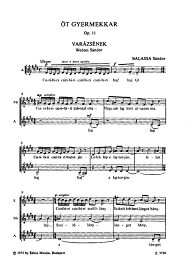The journey of musical works from author to performer
The task of the music publisher is to put manuscripts (be they paper or computerised) into a form that is legible, inspiring, and easy to use for performers; and to ensure the promotion, distribution, and legal use of the works.
With 75 years of experience behind us, we do this honourable work with consideration, commitment, and enthusiasm.
We thank the composers and music teachers who entrust their works to us.
Balassa, Sándor

Biography
Sándor Balassa was born on 20 January, 1935. Having spent his childhood in the countryside, his musical career started in Budapest. After finishing his studies in the Béla Bartók Conservatory, he was working as a technician in a factory. Then, in 1960, he continued his studies at the Budapest Academy of Music where he studied with Endre Szervánszky, graduating in 1965.Having finished his studies, he joined the Hungarian Radio and he worked as a recording producer.
From 1981 he was teaching instrumentation at the Budapest Academy of Music, first as a senior lecturer, then as an associate professor, then, from 1993 to 1996, the year of his retiring, as a professor. In 1996 he created a foundation, called Foundation for the Academy of music, to support the activities of his institution.
Among his compositions the most outstanding ones are, beyond his numerous choral and chamber works, the large-scale orchestral pieces like Glarusi ének (Chant of Glarus,1978), Hívások és kiáltások (Calls and Cries, 1981) or A Nap fiai (The Sons of the Sun, 1995), furthermore his four operas, Az ajtón kívül (The Man Outside, 1986), A harmadik bolygó (The Third Planet, 1989), Karl és Anna and Földindulás (The Catastrophe, 2001).
He died on 14 May 2021 in Budapest.
His prizes and awards
His Requiem Kassák Lajosért (Requiem for Lajos Kassák) was awarded the title “Distinguished composition of the year” at the Tribune in Paris (1972); Erkel Prize (1972); Artist of Merit of the Hungarian People’s Republic (1978); Kossuth Prize (1983); Bartók–Pásztory Award (1988, 1999); Outstanding Artist of the Hungarian People’s Republic (1989); Middle Cross of the Hungarian Award (2012)
 English
English Español
Español Français
Français Magyar
Magyar Polski
Polski Română
Română Slovenský
Slovenský Slovenščina
Slovenščina 中文
中文
















